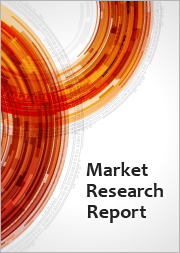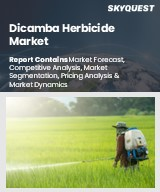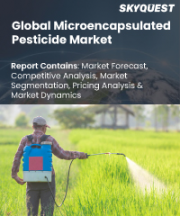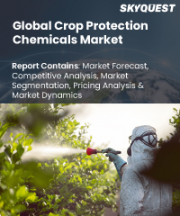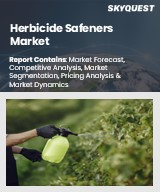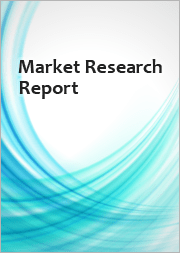
|
시장보고서
상품코드
1570659
3-페녹시벤질알코올 시장 : 용도, 최종 사용자 산업, 순도 유형, 형상, 포장, 판매 채널별 예측(2025-2030년)3-Phenoxybenzyl Alcohol Market by Application (Agriculture, Homecare, Industrial), End-User Industry (Agriculture, Homecare, Manufacturing), Purity Type, Form, Packaging, Sales Channel - Global Forecast 2025-2030 |
||||||
3-페녹시벤질알코올 시장은 2023년에 1,222만 달러로 평가되었고, 2024년에는 1,259만 달러에 도달할 것으로 예측되며, CAGR 3.61%로 성장하여 2030년에는 1,567만 달러에 도달할 것으로 예측됩니다.
3-페녹시벤질알코올은 화학 중간체로서의 효과적인 역할에 의해 다양한 피레스로이드계 살충제의 합성에 널리 사용되는 유기 화합물입니다. 농업 분야의 주요 기능은 해충 방제 제제에서 매우 중요하다는 것을 보여줍니다. 최근의 추세에서는 지속 가능한 관행이 점점 더 중요해지고 있으며, 환경 친화적 인 해충 관리 솔루션에서 이러한 화학 물질에 대한 수요가 증가하고 있습니다. 최종 용도는 주로 농업과 가정 부문이며 식량 안보와 위생에 대한 세계의 관심이 높아지면 상당한 성장 여지가 있습니다. 성장에 영향을 미치는 주요 요인으로는 농업 활동 확대, 해충 방제 기준의 엄격화, 가정용 해충 기피제 수요 증가 등이 있습니다. 그러나 시장은 화학 농약의 사용과 관련된 잠재적 규제 과제와 환경 우려가 있으며, 기업은 생분해성 대체 물질의 기술 혁신을 추진하고 있습니다. 유럽과 같은 지역에서는 최근 농업에서 화학물질 사용량을 줄이는 규제가 도입되었기 때문에 업계는 유기적이고 독성이 낮은 해충 방제제에 중점을 두고 큰 비즈니스 기회를 제공 있습니다. 경쟁 우위를 추구하는 기업은 효능과 환경안전에 대한 우려에 대응할 수 있는 신규하고 지속가능한 3-페녹시벤질알코올 변종을 개발하기 위한 연구개발에 투자해야 합니다. 현재 시장은 통합이 진행되고 있지만 생산 공정 최적화, 비용 절감, 제품 품질 향상을 가능하게 하는 최첨단 합성 기술이 통합되어 기술 혁신을 위한 비옥한 토지가 될 가능성이 있습니다.과제에는 원료 가용성과 시장 가격 변동이 포함되며, 이는 생산 규모와 수익성에 영향을 미칠 수 있습니다. 전략적 파트너십과 다양한 공급망을 통해 이러한 복잡한 상황을 극복할 수 있는 기업은 성장 전망을 효과적으로 활용할 수 있을 것으로 보입니다. 시장 역학은 해충 방제의 필요성에 의한 안정적인 수요와 환경과 규제 상황에 좌우되는 잠재적인 변동이 혼재하고 있음을 보여주고 있으며, 연구와 혁신의 기계가 익은 진화하는 정세를 보여줍니다.
| 주요 시장 통계 | |
|---|---|
| 기준년(2023) | 1,222만 달러 |
| 예측년(2024) | 1,259만 달러 |
| 예측년(2030) | 1,567만 달러 |
| CAGR(%) | 3.61% |
시장 역학: 빠르게 진화하는 3-페녹시벤질 알코올 시장의 주요 시장 인사이트 공개
3-페녹시벤질 알코올 시장은 수요 및 공급의 역동적인 상호작용에 의해 변모하고 있습니다. 이러한 시장 역학의 진화를 이해함으로써 기업은 충분한 정보를 바탕으로 투자결정, 전략적 결정 정밀화, 새로운 비즈니스 기회 획득에 대비할 수 있습니다. 이러한 동향을 종합적으로 파악함으로써 기업은 정치적, 지리적, 기술적, 사회적, 경제적인 영역에 걸친 다양한 리스크를 경감할 수 있음과 동시에, 소비자 행동과 그것이 제조 비용이나 구매 동향에 미치는 영향을 보다 명확하게 이해할 수 있습니다.
- 시장 성장 촉진요인
- 엄격한 환경 규제를 배경으로 농업 분야의 친환경 농약 제품에 대한 수요 증가
- 그 유효성과 안전성에 의해 해충 방제나 매개자 관리에 있어서의 합성 피레스로이드의 채용이 증가
- 유기농업의 건강상의 이점에 대한 소비자의 의식이 높아짐에 따라 바이오의 살충제 수요가 증가합니다.
- 시장 성장 억제요인
- 원료의 가용성 제한과 원료 가격의 변동에 의한 공급망의 혼란
- 시장 기회
- 보다 안전한 대체품으로서 가정용 및 공업용 세정제에 3-페녹시벤질알코올의 사용 증가
- 해충 방제 효율을 높이기 위해, 농약 처방에 있어서의 3-페녹시벤질알코올의 선호의 높아
- 시장의 과제
- 3-페녹시벤질 알코올 부문에서의 엄격한 규제 요건과 컴플라이언스상의 과제, 제품 혁신
Porter's Five Forces: 3-페녹시벤질 알코올 시장을 탐색하는 전략 도구
Porter's Five Forces 프레임워크는 3-페녹시벤질 알코올 시장 경쟁 구도를 이해하는 중요한 도구입니다. Porter's Five Force Framework는 기업의 경쟁력을 평가하고 전략적 기회를 탐구하는 명확한 기술을 제공합니다. 이 프레임워크는 기업이 시장 내 세력도를 평가하고 신규 사업의 수익성을 판단하는 데 도움이 됩니다. 이러한 통찰을 통해 기업은 자사의 강점을 활용하고, 약점을 해결하고, 잠재적인 과제를 피할 수 있으며, 보다 강인한 시장에서의 포지셔닝을 보장할 수 있습니다.
PESTLE 분석 : 3-페녹시벤질 알코올 시장에서 외부로부터의 영향 파악
외부 거시환경 요인은 3-페녹시벤질 알코올 시장의 성과 역학을 형성하는데 매우 중요한 역할을 합니다. 정치적, 경제적, 사회적, 기술적, 법적, 환경적 요인 분석은 이러한 영향을 탐색하는 데 필요한 정보를 제공합니다. PESTLE 요인을 조사함으로써 기업은 잠재적인 위험과 기회를 더 잘 이해할 수 있습니다. 이 분석을 통해 기업은 규제, 소비자 선호, 경제 동향의 변화를 예측하고 앞으로 예상되는 적극적인 의사 결정을 할 준비를 할 수 있습니다.
시장 점유율 분석: 3-페녹시벤질 알코올 시장에서 경쟁 구도 파악
3-페녹시벤질 알코올 시장의 상세한 시장 점유율 분석을 통해 공급업체의 성과를 종합적으로 평가할 수 있습니다. 기업은 수익, 고객 기반, 성장률 등 주요 지표를 비교하여 경쟁 포지셔닝을 밝힐 수 있습니다. 이 분석을 통해 시장 집중, 단편화, 통합 동향을 밝혀내고 벤더들은 경쟁이 치열해지는 가운데 자사의 지위를 높이는 전략적 의사 결정을 내리는 데 필요한 지식을 얻을 수 있습니다.
FPNV 포지셔닝 매트릭스: 3-페녹시벤질 알코올 시장에서 공급업체의 성능 평가
FPNV 포지셔닝 매트릭스는 3-페녹시벤질 알코올 시장에서 공급업체를 평가하는 중요한 도구입니다. 이 행렬을 통해 비즈니스 조직은 공급업체의 비즈니스 전략과 제품 만족도를 기준으로 평가하여 목표에 맞는 충분한 정보를 바탕으로 의사 결정을 내릴 수 있습니다. 네 가지 사분면을 통해 공급업체를 명확하고 정확하게 세분화하여 전략 목표에 가장 적합한 파트너 및 솔루션을 파악할 수 있습니다.
전략 분석 및 추천: 3-페녹시벤질 알코올 시장에서 성공을 위한 길을 그리기
3-페녹시벤질 알코올 시장의 전략적 분석은 세계 시장에서의 프레즌스 강화를 목표로 하는 기업에 필수적입니다. 주요 자원, 능력 및 성과 지표를 검토함으로써 기업은 성장 기회를 파악하고 개선을 위해 노력할 수 있습니다. 이러한 접근 방식을 통해 경쟁 구도에서 과제를 극복하고 새로운 비즈니스 기회를 활용하여 장기적인 성공을 거둘 수 있는 체제를 구축할 수 있습니다.
이 보고서는 주요 관심 분야를 포괄하는 시장의 종합적인 분석을 제공합니다.
1. 시장 침투: 현재 시장 환경의 상세한 검토, 주요 기업의 광범위한 데이터, 시장 도달범위 및 전반적인 영향력 평가.
2. 시장 개척도: 신흥 시장의 성장 기회를 파악하고 기존 분야의 확장 가능성을 평가하며 미래 성장을 위한 전략적 로드맵을 제공합니다.
3. 시장 다양화: 최근 제품 시장, 미개척 지역, 업계의 주요 진보, 시장을 형성하는 전략적 투자를 분석합니다.
4. 경쟁 평가 및 정보 : 경쟁 구도를 철저히 분석하여 시장 점유율, 사업 전략, 제품 포트폴리오, 인증, 규제 당국 승인, 특허 동향, 주요 기업의 기술 진보 등을 검증합니다.
5. 제품 개발 및 혁신 : 미래 시장 성장을 가속할 것으로 예상되는 최첨단 기술, R&D 활동, 제품 혁신을 강조합니다.
또한 이해관계자가 충분한 정보를 얻고 의사결정을 할 수 있도록 중요한 질문에 대답하고 있습니다.
1. 현재 시장 규모와 향후 성장 예측은?
2. 최고의 투자 기회를 제공하는 제품, 부문 및 지역은 어디입니까?
3. 시장을 형성하는 주요 기술 동향과 규제의 영향은?
4. 주요 벤더의 시장 점유율과 경쟁 포지션은?
5. 벤더 시장 진입·철수 전략의 원동력이 되는 수익원과 전략적 기회는 무엇인가?
목차
제1장 서문
제2장 조사 방법
제3장 주요 요약
제4장 시장 개요
제5장 시장 인사이트
- 시장 역학
- 성장 촉진요인
- 엄격한 환경 규제로 농업 분야에서 친환경 농약 제품 수요가 증가
- 합성 피레스로이드는 그 효과와 안전성프로파일에 의해 해충 방제나 매개 동물 관리에 채용이 확대되고 있습니다.
- 유기농업의 건강상의 이점에 관한 소비자의 의식의 고조에 의해 바이오의 농약 수요가 높아지고 있다
- 억제요인
- 원재료공급 부족과 원재료 가격의 변동에 의해 공급 체인이 혼란
- 기회
- 보다 안전한 대체품으로서, 가정용 및 공업용 세정 제품에 있어서의 3-페녹시벤질알코올의 사용이 증가하고 있다
- 해충 방제의 효율을 높이기 위한 농약 배합에 있어서의 3-페녹시벤질알코올의 호감도가 높아지고 있다
- 과제
- 엄격한 규제 요건 및 컴플라이언스 과제 및 3-페녹시벤질 알코올 부문에서의 제품 혁신
- 성장 촉진요인
- 시장 세분화 분석
- Porter's Five Forces 분석
- PESTLE 분석
- 정치적
- 경제
- 사교
- 기술적
- 법률상
- 환경
제6장 3-페녹시벤질알코올 시장 : 용도별
- 농업
- 살균제
- 제초제
- 살충제
- 홈케어
- 방향제
- 세정제
- 소독제
- 산업
- 화학 중간체
- 윤활제
- 용제
- 의약품
- 의약품 유효성분
- 약제 처방
- 중간 화합물
제7장 3-페녹시벤질 알코올 시장 : 최종 사용자 업계별
- 농업
- 홈케어
- 제조업
- 제약
제8장 3-페녹시벤질알코올 시장 순도 유형별
- 95%-99%
- 99% 이상
- 95% 미만
제9장 3-페녹시벤질알코올 시장 : 형태별
- 크리스탈
- 액체
- 분말
제10장 3-페녹시벤질알코올 시장 : 패키징별
- 가방
- 병
- 드럼
제11장 3-페녹시벤질 알코올 시장 : 판매 채널별
- 직접 판매
- 리셀러
- 온라인 판매
제12장 아메리카의 3-페녹시벤질알코올 시장
- 아르헨티나
- 브라질
- 캐나다
- 멕시코
- 미국
제13장 아시아태평양의 3-페녹시벤질 알코올 시장
- 호주
- 중국
- 인도
- 인도네시아
- 일본
- 말레이시아
- 필리핀
- 싱가포르
- 한국
- 대만
- 태국
- 베트남
제14장 유럽·중동 및 아프리카의 3-페녹시벤질알코올 시장
- 덴마크
- 이집트
- 핀란드
- 프랑스
- 독일
- 이스라엘
- 이탈리아
- 네덜란드
- 나이지리아
- 노르웨이
- 폴란드
- 카타르
- 러시아
- 사우디아라비아
- 남아프리카
- 스페인
- 스웨덴
- 스위스
- 터키
- 아랍에미리트(UAE)
- 영국
제15장 경쟁 구도
- 시장 점유율 분석 2023
- FPNV 포지셔닝 매트릭스, 2023
- 경쟁 시나리오 분석
- 전략 분석과 제안
The 3-Phenoxybenzyl Alcohol Market was valued at USD 12.22 million in 2023, expected to reach USD 12.59 million in 2024, and is projected to grow at a CAGR of 3.61%, to USD 15.67 million by 2030.
3-Phenoxybenzyl alcohol is an organic compound prominently used in the synthesis of various pyrethroid pesticides, owing to its effective role as a chemical intermediary. Its primary function in the agricultural sector denotes its importance as it is pivotal in pest control formulations. Recent trends have witnessed an increasing emphasis on sustainable practices, propelling the demand for such chemicals in eco-friendly pest management solutions. End-use applications are predominantly in the agricultural and household sectors, offering considerable scope for growth given the rising global attention on food security and hygiene. Key factors influencing growth include the expansion in agricultural activities, stringent pest control norms, and increasing demand for household pest repellents. However, market limitations involve potential regulatory challenges and environmental concerns associated with chemical pesticide use, urging companies towards innovation in biodegradable alternatives. The industry's shifting focus toward organic and less toxic pest control formulations presents significant opportunities, as recent regulations in regions like Europe favor reduced chemical load in agriculture. Firms seeking competitive advantage should invest in R&D to develop novel, sustainable variants of 3-Phenoxybenzyl alcohol, which can address both efficacy and environmental safety concerns. The market, currently experiencing consolidation, might witness integrating cutting-edge synthesis technologies, which can optimize production processes, reduce costs, and improve product quality - proving to be fertile grounds for innovation. Challenges also include raw material availability and fluctuating market prices, which can affect production scales and profitability. Businesses able to navigate these complexities through strategic partnerships or diversified supply chains could leverage growth prospects effectively. The market dynamics show a blend of stable demand driven by the necessity for pest control with potential volatility hinging on environmental and regulatory developments, indicating an evolving landscape ripe for research and innovation.
| KEY MARKET STATISTICS | |
|---|---|
| Base Year [2023] | USD 12.22 million |
| Estimated Year [2024] | USD 12.59 million |
| Forecast Year [2030] | USD 15.67 million |
| CAGR (%) | 3.61% |
Market Dynamics: Unveiling Key Market Insights in the Rapidly Evolving 3-Phenoxybenzyl Alcohol Market
The 3-Phenoxybenzyl Alcohol Market is undergoing transformative changes driven by a dynamic interplay of supply and demand factors. Understanding these evolving market dynamics prepares business organizations to make informed investment decisions, refine strategic decisions, and seize new opportunities. By gaining a comprehensive view of these trends, business organizations can mitigate various risks across political, geographic, technical, social, and economic domains while also gaining a clearer understanding of consumer behavior and its impact on manufacturing costs and purchasing trends.
- Market Drivers
- Increasing demand for eco-friendly pesticide products in agricultural sectors driven by stringent environmental regulations
- Rising adoption of synthetic pyrethroids in pest control and vector management due to their effectiveness and safety profile
- Growing awareness among consumers regarding health benefits of organic farming boosting demand for bio-based pesticides
- Market Restraints
- Limited availability of raw materials and volatility in raw material prices causing supply chain disruptions
- Market Opportunities
- Rising use of 3-phenoxybenzyl alcohol in household and industrial cleaning products as a safer alternative
- Increasing preference for 3-phenoxybenzyl alcohol in agrochemical formulations for enhanced pest control efficiency
- Market Challenges
- Stringent regulatory requirements and compliance challenges and product innovation in the 3-Phenoxybenzyl Alcohol segment
Porter's Five Forces: A Strategic Tool for Navigating the 3-Phenoxybenzyl Alcohol Market
Porter's five forces framework is a critical tool for understanding the competitive landscape of the 3-Phenoxybenzyl Alcohol Market. It offers business organizations with a clear methodology for evaluating their competitive positioning and exploring strategic opportunities. This framework helps businesses assess the power dynamics within the market and determine the profitability of new ventures. With these insights, business organizations can leverage their strengths, address weaknesses, and avoid potential challenges, ensuring a more resilient market positioning.
PESTLE Analysis: Navigating External Influences in the 3-Phenoxybenzyl Alcohol Market
External macro-environmental factors play a pivotal role in shaping the performance dynamics of the 3-Phenoxybenzyl Alcohol Market. Political, Economic, Social, Technological, Legal, and Environmental factors analysis provides the necessary information to navigate these influences. By examining PESTLE factors, businesses can better understand potential risks and opportunities. This analysis enables business organizations to anticipate changes in regulations, consumer preferences, and economic trends, ensuring they are prepared to make proactive, forward-thinking decisions.
Market Share Analysis: Understanding the Competitive Landscape in the 3-Phenoxybenzyl Alcohol Market
A detailed market share analysis in the 3-Phenoxybenzyl Alcohol Market provides a comprehensive assessment of vendors' performance. Companies can identify their competitive positioning by comparing key metrics, including revenue, customer base, and growth rates. This analysis highlights market concentration, fragmentation, and trends in consolidation, offering vendors the insights required to make strategic decisions that enhance their position in an increasingly competitive landscape.
FPNV Positioning Matrix: Evaluating Vendors' Performance in the 3-Phenoxybenzyl Alcohol Market
The Forefront, Pathfinder, Niche, Vital (FPNV) Positioning Matrix is a critical tool for evaluating vendors within the 3-Phenoxybenzyl Alcohol Market. This matrix enables business organizations to make well-informed decisions that align with their goals by assessing vendors based on their business strategy and product satisfaction. The four quadrants provide a clear and precise segmentation of vendors, helping users identify the right partners and solutions that best fit their strategic objectives.
Strategy Analysis & Recommendation: Charting a Path to Success in the 3-Phenoxybenzyl Alcohol Market
A strategic analysis of the 3-Phenoxybenzyl Alcohol Market is essential for businesses looking to strengthen their global market presence. By reviewing key resources, capabilities, and performance indicators, business organizations can identify growth opportunities and work toward improvement. This approach helps businesses navigate challenges in the competitive landscape and ensures they are well-positioned to capitalize on newer opportunities and drive long-term success.
Key Company Profiles
The report delves into recent significant developments in the 3-Phenoxybenzyl Alcohol Market, highlighting leading vendors and their innovative profiles. These include BASF SE, Bharat Group, Fujian Sannong Calcium Carbonate Co., Ltd., Guangzhou Baiyunshan Pharmaceutical Holdings Co., Ltd, Hebei Yetian Agrochemicals Co., Ltd., Hubei Greenhome Fine Chemical Co., Ltd., Hubei Pharmaceutical Group Ltd., Hubei Xingfa Chemicals Group Co., Ltd., Jiangsu Baoling Chemical Co. Ltd, Jiangsu Changqing Agrochemical Co., Ltd., Jiangsu Yangnong Chemical Group Co.,Ltd, Kalyani Industries Ltd., Lianhetech, Nantong Jiangshan Agrochemical & Chemical, PI Industries, Shin-Etsu Chemical Co., Ltd., Sumitomo Chemical, Tagros Chemicals India Ltd., UPL Limited, and Zhejiang Hetian Chemical Co., Ltd..
Market Segmentation & Coverage
This research report categorizes the 3-Phenoxybenzyl Alcohol Market to forecast the revenues and analyze trends in each of the following sub-markets:
- Based on Application, market is studied across Agriculture, Homecare, Industrial, and Pharmaceuticals. The Agriculture is further studied across Fungicides, Herbicides, and Insecticides. The Homecare is further studied across Air Fresheners, Cleaning Agents, and Disinfectants. The Industrial is further studied across Chemical Intermediates, Lubricants, and Solvents. The Pharmaceuticals is further studied across Active Pharmaceutical Ingredients, Drug Formulations, and Intermediate Compounds.
- Based on End-User Industry, market is studied across Agriculture, Homecare, Manufacturing, and Pharmaceutical.
- Based on Purity Type, market is studied across 95%-99%, Above 99%, and Below 95%.
- Based on Form, market is studied across Crystals, Liquid, and Powder.
- Based on Packaging, market is studied across Bags, Bottles, and Drums.
- Based on Sales Channel, market is studied across Direct Sales, Distributors, and Online Sales.
- Based on Region, market is studied across Americas, Asia-Pacific, and Europe, Middle East & Africa. The Americas is further studied across Argentina, Brazil, Canada, Mexico, and United States. The United States is further studied across California, Florida, Illinois, New York, Ohio, Pennsylvania, and Texas. The Asia-Pacific is further studied across Australia, China, India, Indonesia, Japan, Malaysia, Philippines, Singapore, South Korea, Taiwan, Thailand, and Vietnam. The Europe, Middle East & Africa is further studied across Denmark, Egypt, Finland, France, Germany, Israel, Italy, Netherlands, Nigeria, Norway, Poland, Qatar, Russia, Saudi Arabia, South Africa, Spain, Sweden, Switzerland, Turkey, United Arab Emirates, and United Kingdom.
The report offers a comprehensive analysis of the market, covering key focus areas:
1. Market Penetration: A detailed review of the current market environment, including extensive data from top industry players, evaluating their market reach and overall influence.
2. Market Development: Identifies growth opportunities in emerging markets and assesses expansion potential in established sectors, providing a strategic roadmap for future growth.
3. Market Diversification: Analyzes recent product launches, untapped geographic regions, major industry advancements, and strategic investments reshaping the market.
4. Competitive Assessment & Intelligence: Provides a thorough analysis of the competitive landscape, examining market share, business strategies, product portfolios, certifications, regulatory approvals, patent trends, and technological advancements of key players.
5. Product Development & Innovation: Highlights cutting-edge technologies, R&D activities, and product innovations expected to drive future market growth.
The report also answers critical questions to aid stakeholders in making informed decisions:
1. What is the current market size, and what is the forecasted growth?
2. Which products, segments, and regions offer the best investment opportunities?
3. What are the key technology trends and regulatory influences shaping the market?
4. How do leading vendors rank in terms of market share and competitive positioning?
5. What revenue sources and strategic opportunities drive vendors' market entry or exit strategies?
Table of Contents
1. Preface
- 1.1. Objectives of the Study
- 1.2. Market Segmentation & Coverage
- 1.3. Years Considered for the Study
- 1.4. Currency & Pricing
- 1.5. Language
- 1.6. Stakeholders
2. Research Methodology
- 2.1. Define: Research Objective
- 2.2. Determine: Research Design
- 2.3. Prepare: Research Instrument
- 2.4. Collect: Data Source
- 2.5. Analyze: Data Interpretation
- 2.6. Formulate: Data Verification
- 2.7. Publish: Research Report
- 2.8. Repeat: Report Update
3. Executive Summary
4. Market Overview
5. Market Insights
- 5.1. Market Dynamics
- 5.1.1. Drivers
- 5.1.1.1. Increasing demand for eco-friendly pesticide products in agricultural sectors driven by stringent environmental regulations
- 5.1.1.2. Rising adoption of synthetic pyrethroids in pest control and vector management due to their effectiveness and safety profile
- 5.1.1.3. Growing awareness among consumers regarding health benefits of organic farming boosting demand for bio-based pesticides
- 5.1.2. Restraints
- 5.1.2.1. Limited availability of raw materials and volatility in raw material prices causing supply chain disruptions
- 5.1.3. Opportunities
- 5.1.3.1. Rising use of 3-phenoxybenzyl alcohol in household and industrial cleaning products as a safer alternative
- 5.1.3.2. Increasing preference for 3-phenoxybenzyl alcohol in agrochemical formulations for enhanced pest control efficiency
- 5.1.4. Challenges
- 5.1.4.1. Stringent regulatory requirements and compliance challenges and product innovation in the 3-Phenoxybenzyl Alcohol segment
- 5.1.1. Drivers
- 5.2. Market Segmentation Analysis
- 5.3. Porter's Five Forces Analysis
- 5.3.1. Threat of New Entrants
- 5.3.2. Threat of Substitutes
- 5.3.3. Bargaining Power of Customers
- 5.3.4. Bargaining Power of Suppliers
- 5.3.5. Industry Rivalry
- 5.4. PESTLE Analysis
- 5.4.1. Political
- 5.4.2. Economic
- 5.4.3. Social
- 5.4.4. Technological
- 5.4.5. Legal
- 5.4.6. Environmental
6. 3-Phenoxybenzyl Alcohol Market, by Application
- 6.1. Introduction
- 6.2. Agriculture
- 6.2.1. Fungicides
- 6.2.2. Herbicides
- 6.2.3. Insecticides
- 6.3. Homecare
- 6.3.1. Air Fresheners
- 6.3.2. Cleaning Agents
- 6.3.3. Disinfectants
- 6.4. Industrial
- 6.4.1. Chemical Intermediates
- 6.4.2. Lubricants
- 6.4.3. Solvents
- 6.5. Pharmaceuticals
- 6.5.1. Active Pharmaceutical Ingredients
- 6.5.2. Drug Formulations
- 6.5.3. Intermediate Compounds
7. 3-Phenoxybenzyl Alcohol Market, by End-User Industry
- 7.1. Introduction
- 7.2. Agriculture
- 7.3. Homecare
- 7.4. Manufacturing
- 7.5. Pharmaceutical
8. 3-Phenoxybenzyl Alcohol Market, by Purity Type
- 8.1. Introduction
- 8.2. 95%-99%
- 8.3. Above 99%
- 8.4. Below 95%
9. 3-Phenoxybenzyl Alcohol Market, by Form
- 9.1. Introduction
- 9.2. Crystals
- 9.3. Liquid
- 9.4. Powder
10. 3-Phenoxybenzyl Alcohol Market, by Packaging
- 10.1. Introduction
- 10.2. Bags
- 10.3. Bottles
- 10.4. Drums
11. 3-Phenoxybenzyl Alcohol Market, by Sales Channel
- 11.1. Introduction
- 11.2. Direct Sales
- 11.3. Distributors
- 11.4. Online Sales
12. Americas 3-Phenoxybenzyl Alcohol Market
- 12.1. Introduction
- 12.2. Argentina
- 12.3. Brazil
- 12.4. Canada
- 12.5. Mexico
- 12.6. United States
13. Asia-Pacific 3-Phenoxybenzyl Alcohol Market
- 13.1. Introduction
- 13.2. Australia
- 13.3. China
- 13.4. India
- 13.5. Indonesia
- 13.6. Japan
- 13.7. Malaysia
- 13.8. Philippines
- 13.9. Singapore
- 13.10. South Korea
- 13.11. Taiwan
- 13.12. Thailand
- 13.13. Vietnam
14. Europe, Middle East & Africa 3-Phenoxybenzyl Alcohol Market
- 14.1. Introduction
- 14.2. Denmark
- 14.3. Egypt
- 14.4. Finland
- 14.5. France
- 14.6. Germany
- 14.7. Israel
- 14.8. Italy
- 14.9. Netherlands
- 14.10. Nigeria
- 14.11. Norway
- 14.12. Poland
- 14.13. Qatar
- 14.14. Russia
- 14.15. Saudi Arabia
- 14.16. South Africa
- 14.17. Spain
- 14.18. Sweden
- 14.19. Switzerland
- 14.20. Turkey
- 14.21. United Arab Emirates
- 14.22. United Kingdom
15. Competitive Landscape
- 15.1. Market Share Analysis, 2023
- 15.2. FPNV Positioning Matrix, 2023
- 15.3. Competitive Scenario Analysis
- 15.4. Strategy Analysis & Recommendation
Companies Mentioned
- 1. BASF SE
- 2. Bharat Group
- 3. Fujian Sannong Calcium Carbonate Co., Ltd.
- 4. Guangzhou Baiyunshan Pharmaceutical Holdings Co., Ltd
- 5. Hebei Yetian Agrochemicals Co., Ltd.
- 6. Hubei Greenhome Fine Chemical Co., Ltd.
- 7. Hubei Pharmaceutical Group Ltd.
- 8. Hubei Xingfa Chemicals Group Co., Ltd.
- 9. Jiangsu Baoling Chemical Co. Ltd
- 10. Jiangsu Changqing Agrochemical Co., Ltd.
- 11. Jiangsu Yangnong Chemical Group Co.,Ltd
- 12. Kalyani Industries Ltd.
- 13. Lianhetech
- 14. Nantong Jiangshan Agrochemical & Chemical
- 15. PI Industries
- 16. Shin-Etsu Chemical Co., Ltd.
- 17. Sumitomo Chemical
- 18. Tagros Chemicals India Ltd.
- 19. UPL Limited
- 20. Zhejiang Hetian Chemical Co., Ltd.






